News
4 July 2022
The Interdisciplinary Higher Education Model for Program Sustainability is available for download!
Project partners have been working hard to create an easy to follow manual for PROGRAM LABS that introduces design thinking. This includes information about using the LAUNCH method, DESIGN@SCHOOL, and Human- cantered design.
The manual provides a 4 day programme to follow, which includes various activities to do with students. The students learn to explore the context, define a problem, think up and choose solutions, work it out and implement their solutions. When they are ready they will present their prototype in front of an audience using the LAUNCH method.
You can download the PDF for interdisciplinary higher education model for program sustainability from the products page.
Read more23 May 2022
PROGRAM LABS event in Leeuwarden
Learning Hub Friesland (NL) was happy to host international partners and youths for the PROGRAM LABS event in Leeuwarden on 20 th May. The event was combined with another project, Deal4eu: Youth Ambassators for European Green Deal, which focuses on sustainability.
Participants spent time in the D'Lab, FabLab Friesland College learning about the LAUNCH method and the various maker tools and machines. They then used recycled materials to create prototypes, which focused on sustainability. Afterwards, they took a tour of the city using electric boats.





16 May 2022
PROGRAM LABS – Cuenca Bootcamp
13 May 2022
PROGRAM LABS partners meetup
It was beautiful sunny weather in Cuenca, Spain where PROGRAM LABS partners met to discuss progress of the project. As Vilnius and Cuenca recently hosted student bootcamps, the first thing on the agenda was to talk about the tips and tops of those events.
- In Vilnius, at Meškėnų laboratorija, the students really got involved in the process of creating prototypes for the visually impaired. There was a lot of positive feedback from both students and partners.
- The bootcamp in Cuenca looked at solving problems in the local community, which resulted in students putting together some creative prototypes. The new Cuenca FabLab was admired by all.
This led to further discussions about lessons learned from the bootcamps, but also throughout the duration of the project. We talked about the next steps to take and how we can continue working on this topic together. Moreover, an online guest from Ireland made a pitch inquiring about partners for a new Erasmus + FabLab project for 2023.
The final topic of discuss was about dissemination activities, and how to further share the project. For the bootcamps, short videos will be made to post on social media, which will highlight the PROGRAM Labs projects and student activities. Furthermore, once the project deliverables are completed, they will be ready for use in other Fablabs across Europe.
We really enjoyed coming together in person to build our professional and personal relationships. We are all excited to produce useful materials that can help others learn about and experience Fablabs.
Erna van der Werff
25 April 2022
PROGRAM LABS – Vilnius Bootcamp
25 March 2022
Bootcamp Cuenca
Work with modern makerspace techniques in the historical town of Cuenca free of charge. 8 to 13 May 2022.
Subscribe to the Bootcamp in Cuenca and work together with students from Spain and Belgium in the Makerspace FabLab Cuenca. You will, while finding solution to local challenges and issues, learn all about modern techniques such as 3D printing, laser cutting and 3D Design.
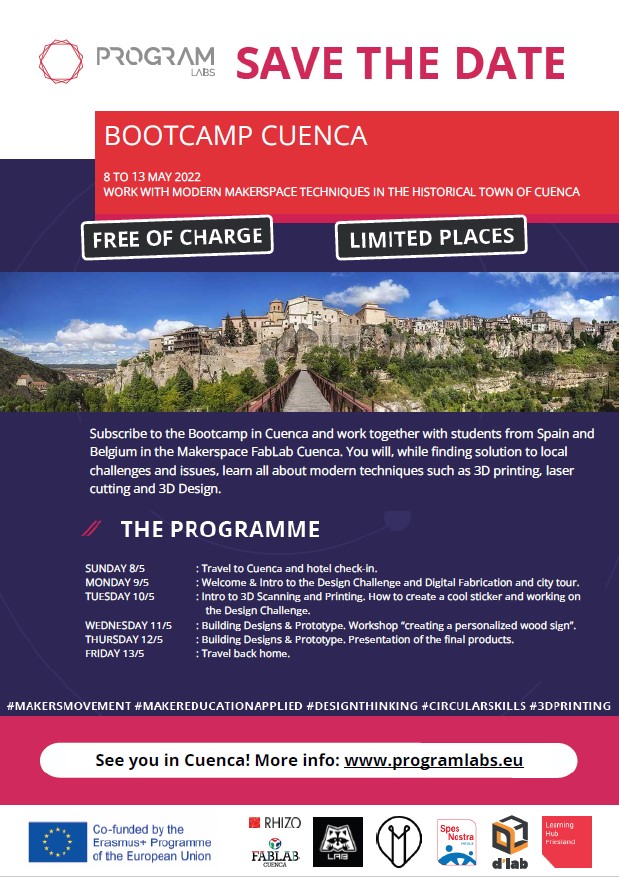 Download the flyer.
Download the flyer.
Erna van der Werff
20 March 2022
Bootcamp Vilnius
Save the date to learn and prototype with different makerspace tools and equipment in the historic and present-day capital of Lithuania free of charge. 18 to 23 April 2022.
Subscribe to the Bootcamp in Vilnius and work together with students from Lithuania, Belgium and the Netherlands in the Makerspace of Vilnius Meškėnų Laboratorija.
You will, while finding solution to local challenges and issues, learn all about modern techniques such as 3D printing, laser cutting and 3D Design.
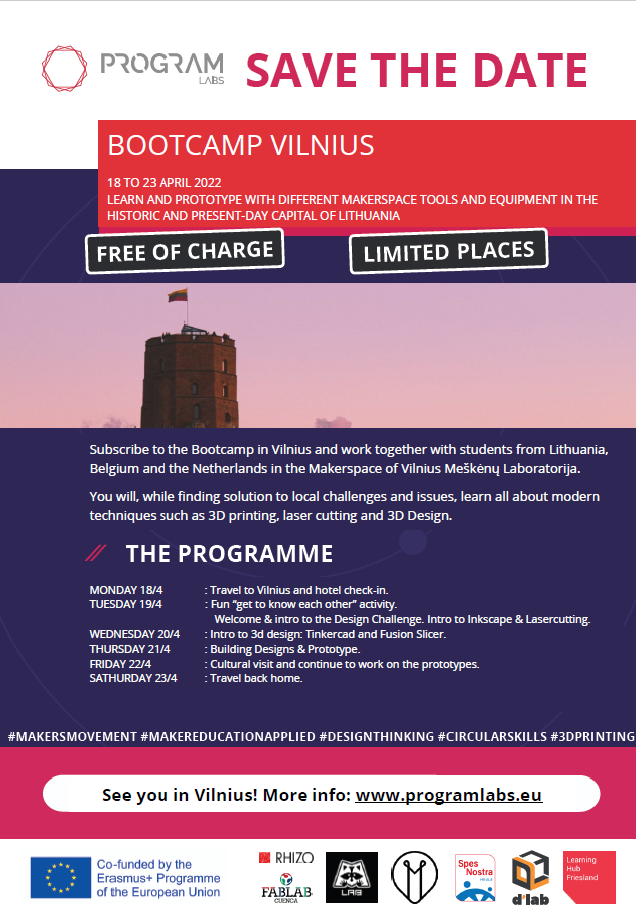 Download the flyer.
Download the flyer.
Erna van der Werff
5 January 2022
Planning the ProgramLabs Bootcamps
The new year has begun! A good moment to make plans for the Bootcamps that the ProgramLabs project will organise in Vilnius Lithuania and Cuenca-Spain.
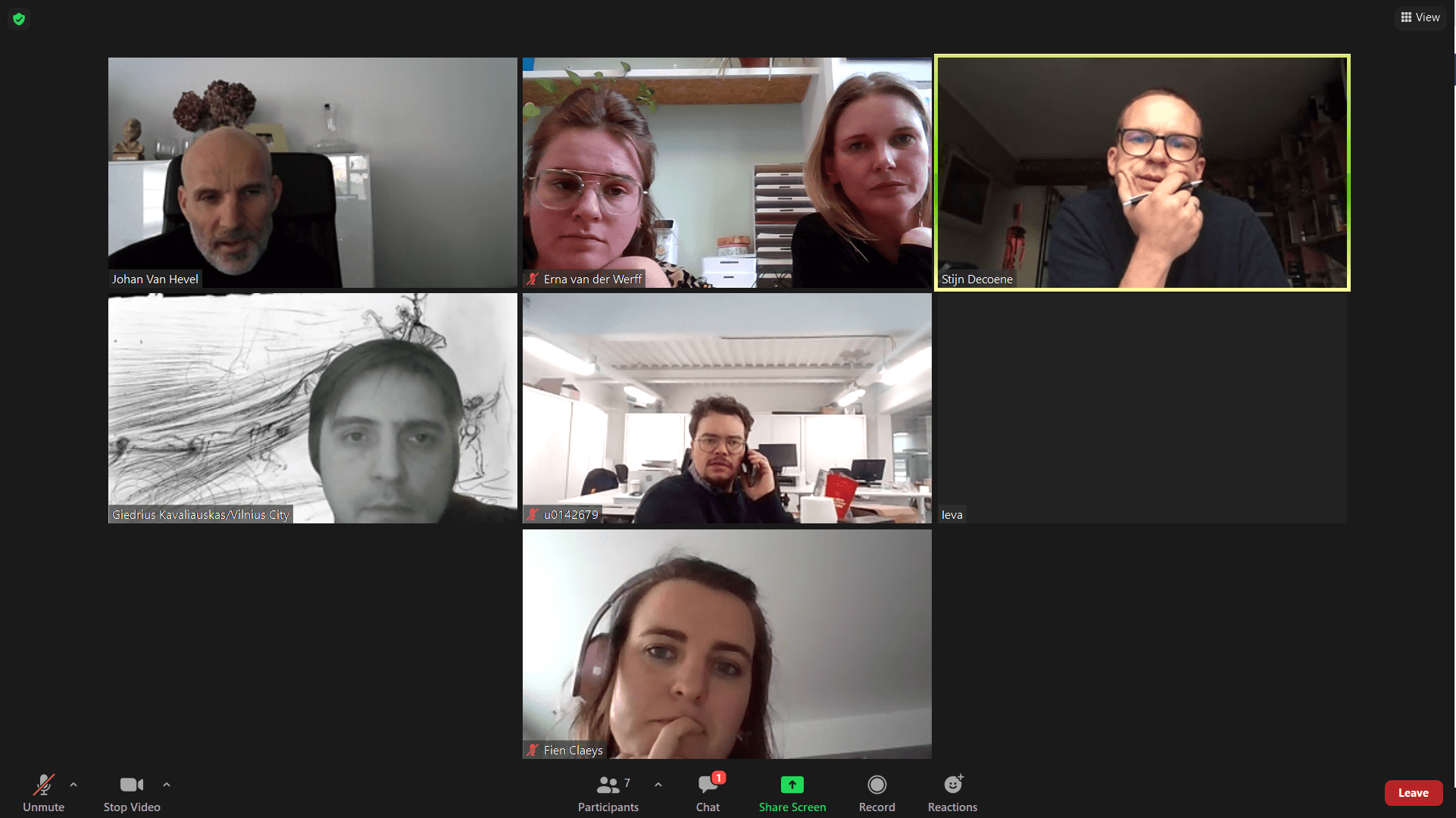
Bootcamp Vilnius will take place from 18 to 23 April 2022 and will be hosted by Project partner M-Lab. The programme will be challenge based. This means that students will, while finding solution to local challenges and issues, learn all about modern techniques. The Design Thinking method will be applied in the activities.
Bootcamp Cuenca will take place from 9 to 13 May and will be hosted my project partner FABLAB CUENCA. Students will learn all about the techniques of Makerspaces, such as 3D printing, Lacercutting and making their own stickers.
The partners got together to discuss the programmes of the bootcamps in details. Keep a close eye on our website for more detailed information about the Bootcamps.
Erna van der Werff
18 November 2021
Difficult decisions
Dutch students that follow the course Creative Craftsmanship at Friesland College in the Netherlands were asked why they would like to participate in the Program Labs Bootcamp that is to be organised early 2022 in Vilnius Lithuania.
The team of Learning Hub Friesland was asked to make a selection based on the motivation letters of the 20 students. A difficult decision to make indeed, as only 5 student can go on the bootcamp!
Student: “I did not hesitate for a moment, this is what I like! With this trip I get the chance to gain experience. I get the chance to share with other people from different countries the knowledge and experience I have gained in recent years.”
Student 2: “It would be fun to gain new experiences. And also for myself to practise with being abroad. I am doing well in school. And I am very excited that I get this opportunity and hope that I can also show my serious side. I have no fear of flying because I have never flown. I hope you will choose me to go with you. Thanks in advance.”
Student 3: ”I am very good at presenting and getting people enthusiastic about things. I am also cheerful and have an active working attitude. My English is good and I enjoy meeting new people. As a former rugby coach, I know how to stand in front of a group.”
After much consideration and deliberation a selection of 5 students was made. We are hoping to make it an excellent learning experience for them!
Erna van der Werff
28 January 2021
A progress meeting full of inspiration
The Program Labs team got together online to discuss progress of the project and look back on the training week and other activities partners conducted in their regions. Of course all of us were forced to turn to online to some extent (some could manage a hybrid teaching form while others were bound to turn to completely digital solutions). What matters is that sharing ways to coop with the current Covid19 situation proved to be a true inspiration. Our Spanish partner Cuenca Fab Lab got really creative by setting up a ‘makers van’, having 3D printing and lasercutting all set-up and ready to go to schools in the region. A good solution enabling more rural schools to use the makerspace facilities in small scale settings.
The next phase in the project will be about letting secondary and vocational students experience makereducation themselves. Vives and Friesland Colleges’ D’Lab are kicking off this phase by starting makerspace courses with students late January / early February 2021. It will be interesting to see how makereducation influences soft skill development of youngsters. As part of the project an impact study was developed by Vives. Will students that truly gain self-confidence, entrepreneurial attitude and a growth mindset by participating in makers education? Scientifical research endorses this statement and we are on the verge of finding out from own experience, with the students we know so well.
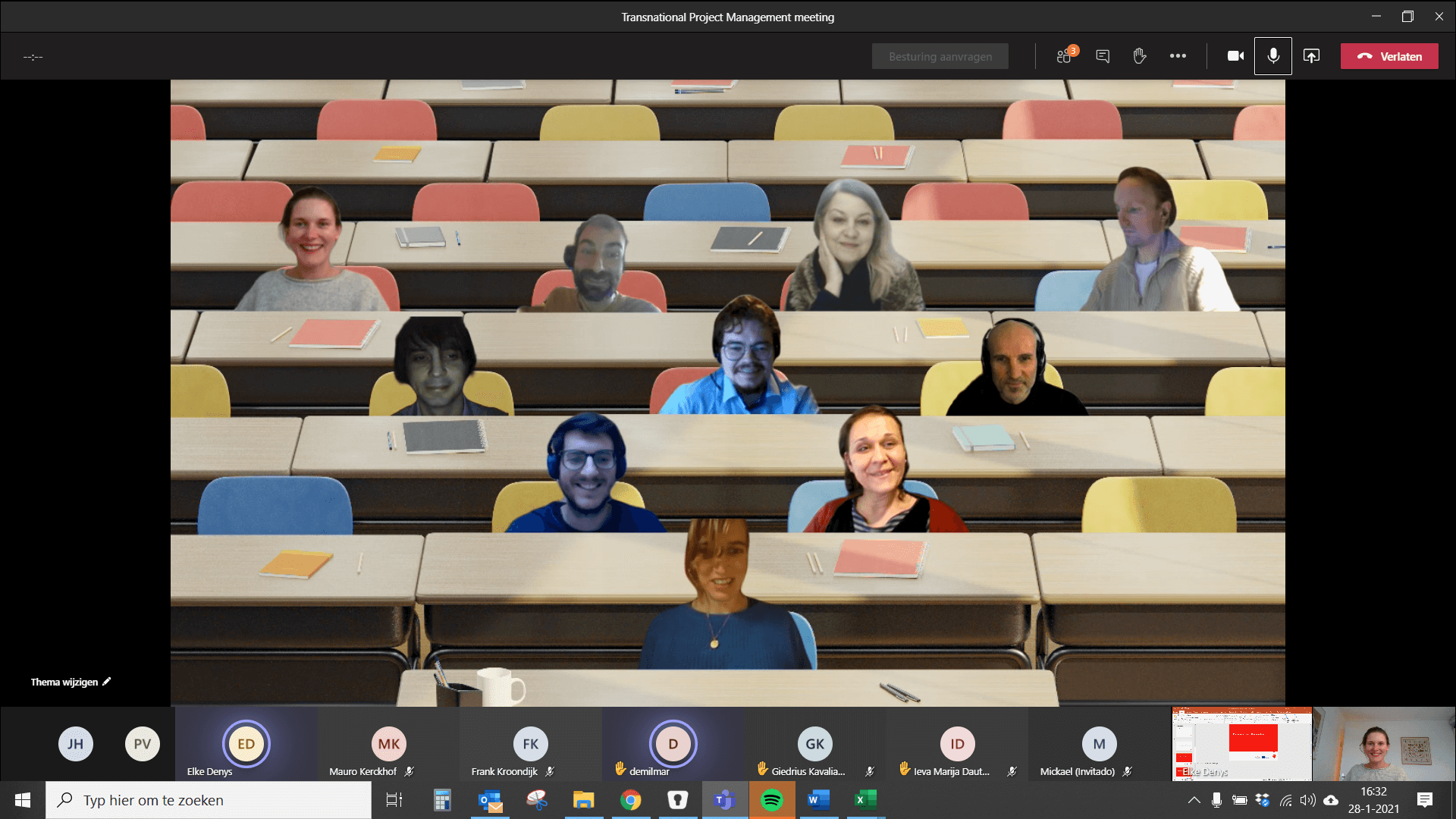
Erna van der Werff
26 January 2021
PROGRAM Labs Teacher Training week after-movie
Early December, Program labs offered a 3-day teacher training event, where participants learned about Design Thinking, software for 3D printing and laser cutting and 21-century skills.
Curious about the training week? Or have you been participating in the event yourself?
Watch the short compilation of the best moments from the 3-day program here:
The more extended 20 minute after-movie can be viewed here:
During the first day, the participants got acquainted with Design Thinking and had to apply their knowledge in the "Gift-Giving Challenge" that takes them through every step of Design Thinking.
On the second day of the event, the participants got a quick introduction to 3D printing and Laser Cutting and then proceeded with a workshop on the software of their choosing!
The last day was focused on Growth Mindset, 21-century skills, and closed with a discussion about the before-mentioned topics.
Erna van der Werff
17 January 2020
The guide provides examples and experiences of how makerspaces can promote skills among European young people.
The guide of good practices has been created to inspire educators across Europe as to how they can use makerspaces to promote skills and reach young people who are at risk of dropping out of education - becoming NEET (not in employment, education or training.)
The guide combines desk research on best practice projects from around the world with practical interviews with educators, FabLab technicians and students from across Europe. We’ve translated the lessons learnt into handy guidelines for all people who want to engage vulnerable youth in the Makermovement.
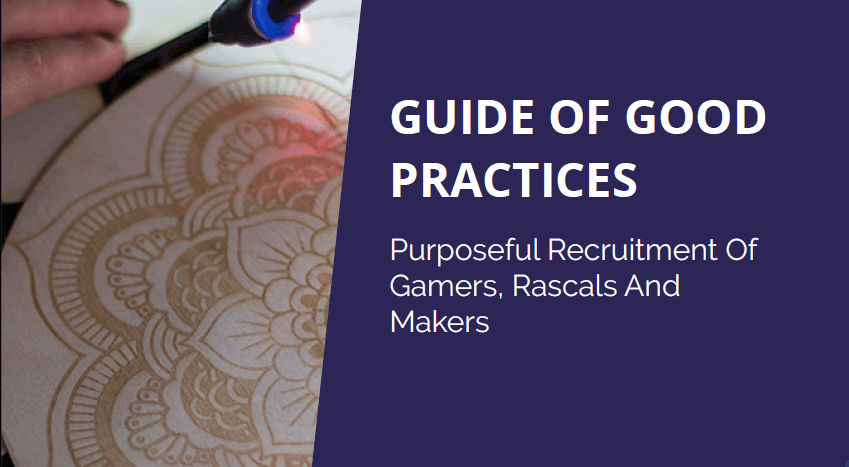 Download the guide.
Download the guide.
Erna van der Werff
30 October 2020
PROGRAM Labs teacher training
Makerspaces have a significant impact on the learning of students, the development of entrepreneurial skills and the personal development.
Subscribe to the online course if you want to learn how to use ánd apply design thinking, makers education (3D printing) and circular skills in your lessons.
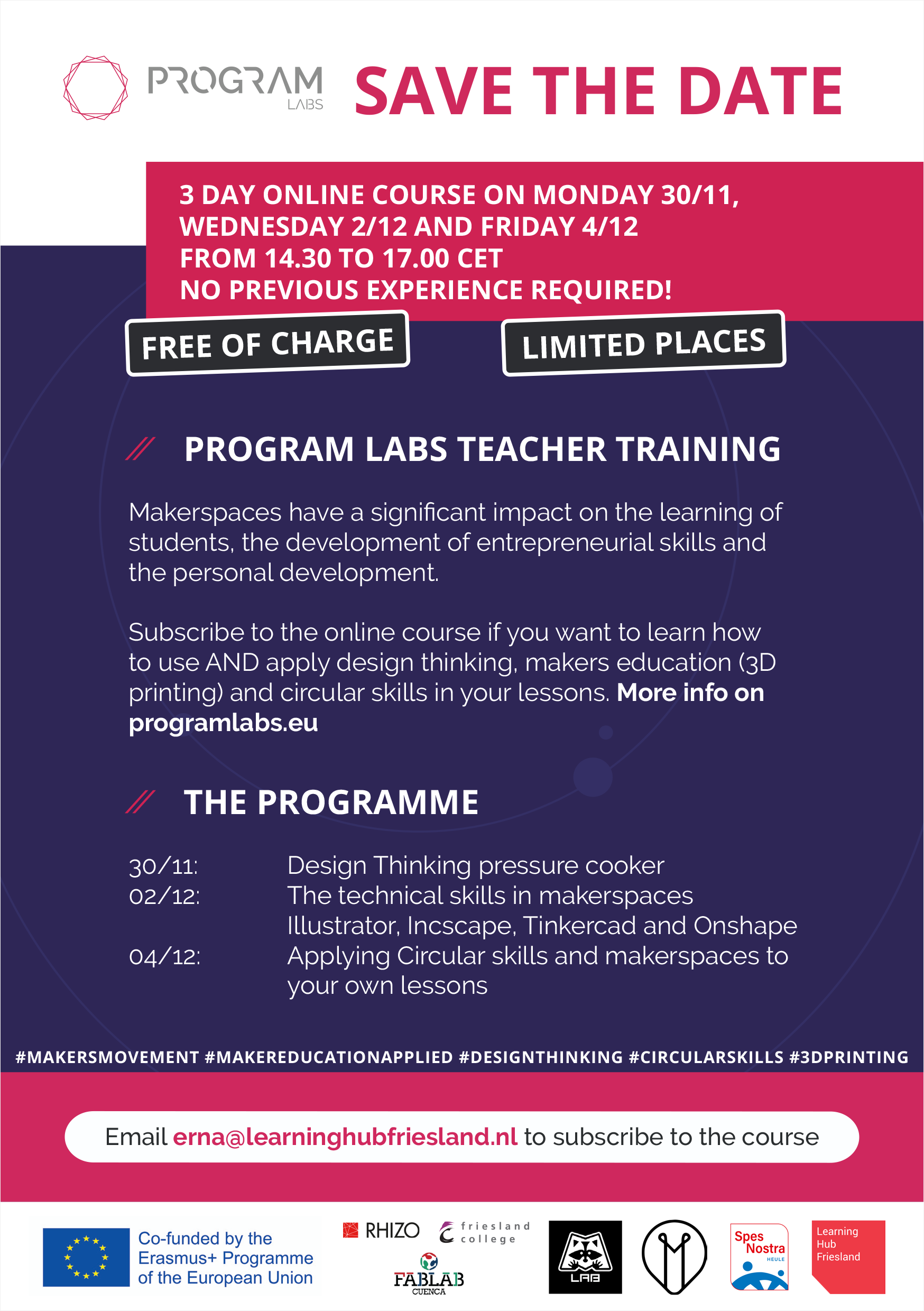 More info
More info
Erna van der Werff
February 2020
What influence can Makerspaces have in the mission to prevent students from dropping out of school? That is the central question of the international project 'PROGRAM labs'.
Makerspaces and schools from Belgium, Spain, Lithuania and the Netherlands got together in Kortrijk, BE at the premises VIVES University of Applied Sciences to deliberate ‘How can we use our Makerspace and Fab Labs to combat early school leaving?’
Questions arose like ‘Who are these young people? What characteristics and behaviour of students can be indicators of an increased risk of dropping out? What kind of programs could resonate with this target group and how do you facilitate and support this? How do you combine this with 'regular' education?’
After the research phase Program Labs will transfer the first findings into a full training week for youth at the M-Lab makerspace in Vilnius, LT in April 2020.
Besides lead partner VIVES, Spes Nostra and Rhizo from Belgium, Friesland College D’Lab and the Learning Hub Friesland Foundation from the Netherlands, Fab Lab Cuenca from Spain and M Lab Vulius from Lithuania participate in the project.
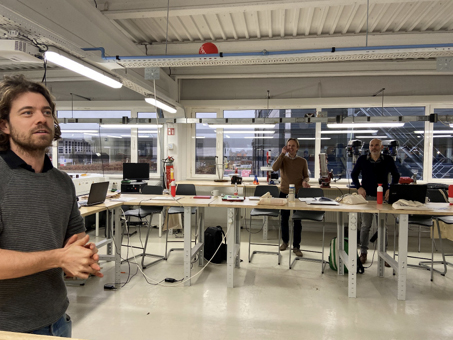
Erna van der Werff
November 2019
European organisations join forces to inspire young unmotivated people by learning and experimenting in Makerspaces.
All over the world, more and more Makerspaces pop-up. And that’s no surprize. Making is vital to what it means to be human. There is something unique about making tangible things. Creating is not just a 'nice' activity; it transforms, connects and empowers.
This is exactly the reason that 7 educational partners from Belgium, the Netherlands, Spain and Lithuania joined forces to open up makerspace to youth on the verge of dropping out of school and actively involve this group of individuals in the Makerspaces. How can makerspaces motivate and empower them to take control over their personal and professional life?
In November 2019, the partners of the Program Labs project met at Fab Lab Cuenca to discuss the approach. The first step to increase the impact of Makerspaces on the learning of students, the development of their entrepreneurial skills and their personal development, is making an inventory of similar successful approaches in Europe. This will result in a guide of best practice and form the basis for the development of workshops and curricula in the Program Labs project.
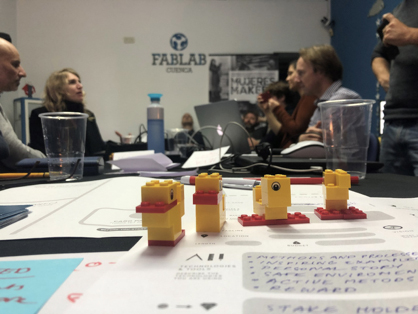
Erna van der Werff